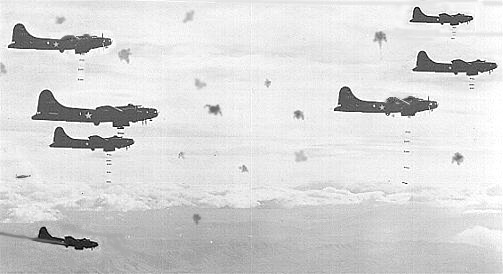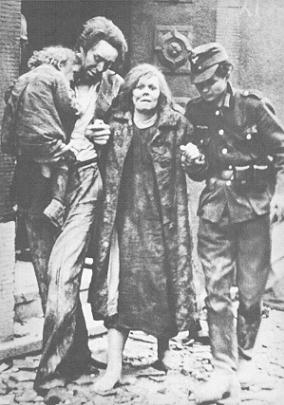
Find the perfect fit with Amazon Prime. Try Before You Buy.



On the Internet newsgroup, soc.history.war.world-war-ii, World War II battles are refought, the FW-190 and the Zero face off in imaginary dogfights and the Sherman, Tiger and T-34 tanks compete again for engineering supremacy. Recently, when the forum took up the subject of the best WWII TV documentaries, I joined the discussion with this:
" In the mid-1980's NBC produced a documentary on the 8th Air Force entitled, "All the Fine Young Men." Of the many TV documentaries I've seen in which B-17s and the European air war were featured, this documentary reflected most accurately the war that I experienced. Because I was there as a participant -- a B-17 pilot with the 91st Bomb Group -- it's altogether likely that my nomination of "All the Fine Young Men" as the best WWII TV documentary is lacking in objectivity."
The posting generated several responses, one of which presented me with the following questions:
" Was there ever a thought on what these bombs would do once they reached the remote ground? Did you and the other fine young men ever consider this?"
These I judged to be rhetorical provocation’s and therefore best ignored. Otherwise, I had the option of posting a response to the newsgroup for all the world to read or of replying directly to the questioner by E-mail. I chose the E-mail option:
"No, I must confess that I, nor any member of my crew, nor anyone that I knew among the thousands of downed air crew members in my POW camp ever gave thought to the ethics of our bombing and thus to our killing of German civilians. But were we not in fact, as your questions imply, participants in an immoral act? No, I don't think so. We lived in an ethical world that you, judging by the very fact that you raise the question, would not now be able to recognize. The past is indeed another country."

To this, my questioner, who identified herself as Erika
replied:
"We both inhabit that same past: you as an airman and I as a young child. You delivered bombs; I was terrified of them." The word, "terrified" had a resonance. To the German people, the air crews of the RAF and the 8th Air Force were known as "terrorfliegers." Was Erika's use of "terrified" an allusion to this idiom? Intrigued by the possibility, I asked her: "Was I the indifferent and immoral terrorflieger and you the innocent and terrorized child below?" and I learned that yes, this was true.

Erika wrote:
"What I do recall vividly is the droning sound of the bomber swarms high above us. The terror was real."
In resurrecting the long-dormant expression, "terrorflieger", in my E-mail letter, I'd triggered the memory of a quite memorable wartime incident which I related to Erika:
In early May, 1945, after the Russian army had liberated my POW camp, several days passed and no word reached us as to when we might be evacuated. As a result, I and one of my POW roommates, in our impatience, took off for the British lines a hundred miles away. On the main road west, we found ourselves trudging along in a stream of German refugees who hoped to escape the raping and vandalizing Russian army by reaching the relative safety of the British lines.
On the third day of our trek we overtook a young woman, her mother, and her daughter of about six or seven. We fell in beside them. We conversed as best we could with pantomime and mutually understood German and English words. We learned from the young woman that her husband was last heard of fighting somewhere in the East.
Before leaving the POW camp, my roommate and I had packed Spam, D-bars (chocolate), sugar and other food items from American Red Cross parcels. Now that we were nearing the British lines where presumably food would be provided, we decided that we should share our supply with the two women and little girl. It's remarkable how food can elevate spirits and for a brief while the five of us walked along as if on a carefree outing. The young woman asked about us and we told her that we were kriegsgefangeners from a stalag near the town of Barth. "Terrorfliegers!" the young woman cried in mock anger, her little fists pounding my arm. "Ja, terrorfliegers," we admitted.
A few miles down the road, we came to a Russian check-point and my roommate and I were passed through but our three companions were detained. When we left them, the young woman waved good-bye, "Auf Wiedersehen, terrorfliegers."
In her return letter Erika wrote that "I squeezed a little tear back" because "both of us had been there." She told me that she, also, when a little girl about the age of the child we'd met on our journey to the West, had once found herself among a stream of refugees.
As so often happens in E-mail correspondence with someone who only a short time before had been a stranger, there is an initial rapport found in the sharing of experiences, followed all too quickly, it seems, by a waning and an unacknowledged termination. There seems nothing more either cares to say. Thus it was with Erika and me. We never overtly gave expression to the fact that our pleasant relationship was at an end. But it would have been fitting, I think, even though a bit mawkish, had Erika ended our E-mail encounter with the same words used by the young woman whom I had left standing beside the road at that Russian check-point.
